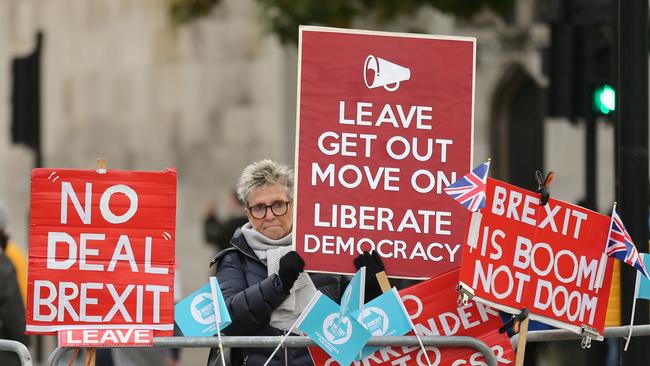Brexit election: Prediction a mug’s game this time round
Increasing polarisation of voters and fragmentation of the old two-party system means anything could happen in Britain’s poll.

After years of deadlock and recrimination over Brexit, Britain is heading for another early general election in December to settle the matter. The promise by Prime Minister Boris Johnson to get Brexit done by October 31, “do or die”, has been killed off by parliament.
But at the fourth time of asking, on Wednesday morning (AEDT), he secured backing for an early election after agreeing to set aside temporarily his EU withdrawal bill. Britain will thus go to the polls for the third time in less than five years on December 12, to elect 650 Westminster MPs.
Johnson will be hoping to improve upon the disastrous performance of his predecessor, Theresa May, whose snap election in 2017 backfired. Her Conservative Party threw away a 17-seat majority, and had to govern as a minority government with a “confidence and supply” deal with Northern Ireland’s Democratic Unionist Party.
That has blocked the government’s ability to pass May’s and Johnson’s Brexit deals, as well as the threat to leave without a deal.
The election is particularly hard to predict, for two reasons. First, Britain’s electoral landscape has changed markedly. The country has become polarised into Leave and Remain camps. At the same time, the old two-party system has fragmented into more of a four-party configuration; in addition to the Conservatives and Labour, the strongly pro-Remain Liberal Democrats and the avidly pro-Leave Brexit Party both poll in double figures. Moreover, Scottish and Welsh nationalists have drawn support.
A second factor is that under Britain’s first-past-the-post electoral system, in which seats are allocated to candidates who win a plurality of votes in their constituencies, voters are increasingly likely to vote tactically — switching parties to maximise support for the strongest Leave or Remain candidates.
Since the EU referendum in June 2016, Britain has become a country that votes increasingly by age. Jeremy Corbyn, the avowedly socialist Labour leader, enjoyed a cult-like status among many young people going into the June 2017 general election. He will be hoping to energise the young once more, yet he faces a battle with the Liberal Democrats for their vote.
The Tories may not seem a natural home for many blue-collar workers, but Johnson — who was educated at Eton, Britain’s most famous private school, and speaks with a posh accent — is a charismatic leader. He also promises to invest in Britain’s beleaguered public services and to leave the EU quickly. As a result, the Tories now attract nearly as many blue-collar voters as Labour does.
At the same time, Labour’s softer line on Brexit has won it support among rich folk who might otherwise baulk at Corbyn’s left-wing manifesto.
The Conservatives hope to gain seats in Labour’s pro-Brexit northern heartlands and Labour will want to make gains in pro-EU metropolitan constituencies. The SNP is expected to wrestle more votes from the other parties in Scotland and add to its tally of 35 seats out of a possible 59.
The Economist



To join the conversation, please log in. Don't have an account? Register
Join the conversation, you are commenting as Logout